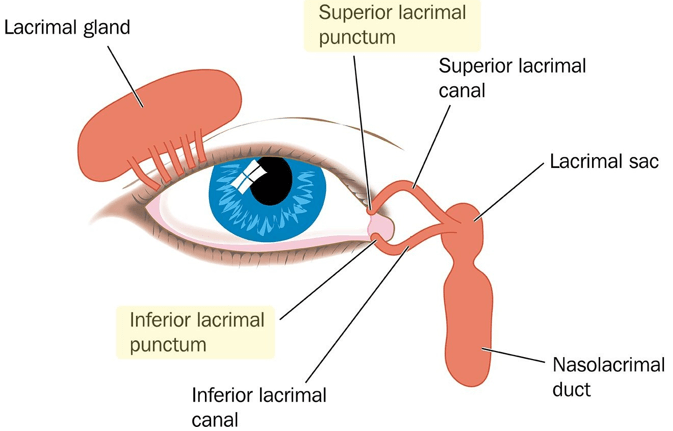A nurse is preparing to administer eye drops to a child.
Which of the following actions should the nurse take?
Apply pressure to the lacrimal punctum after administering the drops.
Position the child side-lying on the bed before administering the drops.
Wipe from the outer to the inner canthus after administering the drops.
Flush the eye with normal saline solution before administering the drops.
The Correct Answer is A
a. Apply pressure to the lacrimal punctum after administering the drops.
When administering eye drops to a child, the nurse should apply gentle pressure to the lacrimal punctum (the small opening in the inner corner of the eye) after administering the drops. This can help prevent the medication from draining into the tear duct and being absorbed into the bloodstream, which can reduce systemic side effects.

Nursing Test Bank
Naxlex Comprehensive Predictor Exams
Related Questions
Correct Answer is A
Explanation
Opioid medications can cause urinary retention by inhibiting the normal function of the bladder and reducing the urge to urinate. This can lead to incomplete emptying of the bladder and increased urine retention. Nurses should monitor clients receiving opioids for signs of urinary retention, such as decreased urine output, distended bladder, or discomfort in the lower abdomen.
Opioids generally cause pupil constriction (miosis) rather than dilation (mydriasis). Dilated pupils may indicate other drug use or neurological issues, but they are not a typical adverse effect of hydromorphone.
Hydromorphone is more likely to cause hypotension (low blood pressure) as an adverse effect rather than hypertension (high blood pressure).
Hydromorphone can cause respiratory depression, which is characterized by decreased respiratory rate and depth. Tachypnea (rapid breathing) is not a typical adverse effect of hydromorphone.
Correct Answer is B
Explanation
This statement demonstrates an understanding of the concept of spacing out immunizations to reduce the number of shots given during a single visit. By making multiple office visits, the parent can ensure that their child receives the recommended immunizations while minimizing the number of injections at each visit.
Lactose intolerance is not a contraindication to receiving immunizations. Most vaccines do not contain lactose, and even if they do, the amount present is typically minimal and not expected to cause an adverse reaction in individuals with lactose intolerance.
The first flu immunization is typically recommended for children starting at 6 months of age, not at 6 years of age.
The human papillomavirus (HPV) vaccine is typically recommended for preteens and adolescents, usually starting between the ages of 11 and 12. It is not typically administered when a child enters kindergarten.
Whether you are a student looking to ace your exams or a practicing nurse seeking to enhance your expertise , our nursing education contents will empower you with the confidence and competence to make a difference in the lives of patients and become a respected leader in the healthcare field.
Visit Naxlex, invest in your future and unlock endless possibilities with our unparalleled nursing education contents today
Report Wrong Answer on the Current Question
Do you disagree with the answer? If yes, what is your expected answer? Explain.
Kindly be descriptive with the issue you are facing.
